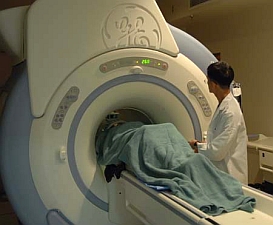Researchers at Johns Hopkins University in Baltimore have found what they believe is a likely cause of the dizzy feeling patients experience when subjected to magnetic resonance imaging (MRI) scans. The findings from the team led by systems engineer Dale Roberts appear online in the journal Current Biology.
Many patients undergoing MRI scans complain of vertigo — a dizzying sensation of free-falling — while inside or coming out of the tunnel-like MRI machine. Roberts and colleagues from the Johns Hopkins medical school and Federico II University of Naples in Italy tested if the MRI’s strong magnetic field pushes on fluid that circulates in the inner ear’s balance center, leading to a feeling of unexpected or unsteady movement.
The Johns Hopkins team placed 10 volunteers with healthy labyrinths — inner tube-like structures in the ears that control balance — and two volunteers who lacked labyrinthine function into MRI scanners. The researchers asked the subjects to report any vertigo-like experiences, but they also measured involuntary eye movements reflecting the brain’s detection of motion.
The eye-movement measurements were conducted in the dark, to prevent visual clues from suppressing eye movements, and the researchers used night-vision cameras to record those movements. The night-vision footage revealed that all of the healthy volunteers had involuntary eye movements in the MRI, but those without labyrinthine function did not, which indicates the labyrinth plays a key role in MRI-related vertigo.
The researchers also tested the effect of varying strength levels of the magnetic fields and the impact of the direction patients entered the MRI tunnel on vertigo experiences. The team found stronger magnetic fields caused significantly faster eye movements, which persisted throughout the time volunteers spent in the machine, no matter how long the experiments lasted. Also, the direction of the eye movements changed depending on which way the volunteers entered the MRI tunnels, which suggests that the effect on the labyrinth was directionally sensitive.
The evidence, say the researchers, most likely points to MRI-related vertigo being a result of the interplay between electrical currents flowing through the salty fluid in the canals of the labyrinth and MRI’s magnetic field. A phenomenon in physics called the Lorentz force may explain how the current of charged particles in the inner ear’s fluid exerts a force on cells that use the fluid’s flow as a way to sense motion.
Roberts says the research has implications for MRI scans on the brain itself. A technique known as functional MRI (fMRI) measures brain activity by tracking blood flow in the brain as subjects perform tasks. The new findings suggest that the scanner itself could be causing previously unnoticed brain activity related to movement and balance, potentially affecting fMRI results.
Read more: Mayo Clinic, GE to Research Brain-Scan MRI Technology
* * *


 RSS - Posts
RSS - Posts
You must be logged in to post a comment.